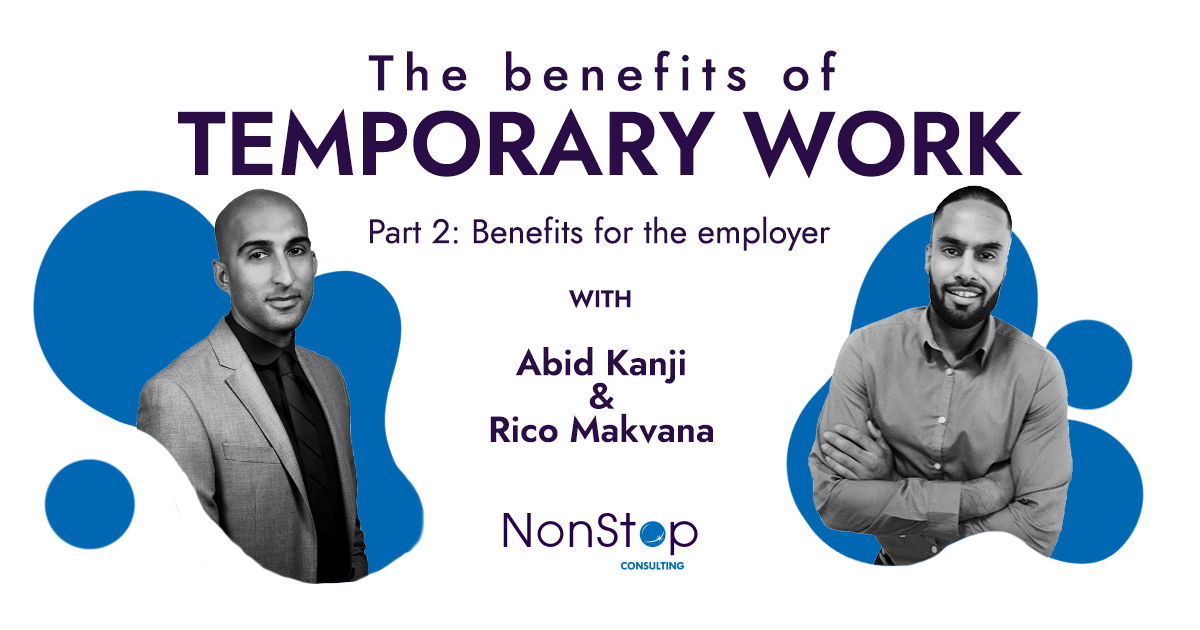Temporary or contract work has many benefits for both employers and employees. For employers, it provides flexibility in managing workforce fluctuations, access to specialised skills, and a trial period to assess potential hires.
For employees on the other hand, temporary work offers flexibility in work schedule and duration, opportunities for gaining diverse experience and skill enhancement, and quick employment options while maintaining professional growth.
In this two-part series, we will lean on the experiences of two of our most senior contract recruiters, Rico Makvana and Abid Kanji, to explore the benefits for both sides of the employment relationship.
Part two: Benefits for Employers
Temporary work benefits employers by offering flexibility in adjusting their workforce based on fluctuating demands and short-term projects, according to Abid, a director and headhunter in our European chemical division
It provides access to specialised skills and expertise without the long-term commitments associated with permanent positions.
According to Rico, a business unit manager in our UK social care division, temporary work also allows for a trial period to assess a candidate’s fit within the organisation before making a long-term commitment, minimising hiring risks.
In this part of the article, we’re going to explore the main benefits temporary or contract work can offer an employer. For employee benefits, see part one of the article here.
Workforce flexibility
Temporary and contract jobs allow employers to adjust their workforce according to fluctuating demands and short-term projects.
According to Rico, this is particularly beneficial for companies faced with seasonal demands, those going through periods of growth, or those with specific projects.
“Such companies can quickly scale up or down based on business needs without the commitment of permanent positions, allowing them to efficiently adapt to customer demands and ensure smooth operations without the long-term financial burden” he says.
Cost Savings
Following the previous point, Abid says, hiring temporary or contract employees can be more cost-effective for employers.
“They can not only protect themselves from high staffing costs during periods of less customer demand, for example, but also save on expenses such as benefits, healthcare, and other long-term commitments associated with permanent positions,” he says.
Depending on local employment laws and length of contract, companies don’t usually have to pay temporary workers benefits such as bonuses, health insurance, pension contributions, holiday or sick pay, and other financial benefits.
And depending on the company set-up, he adds, money can also be saved when it comes to onboarding and training the temporary employee since they would typically come with the specific skills needed for the role, and may not need the full onboarding experience a permanent employee would.
“Another factor to consider is that permanent, long-term employees, can also be a cost from a retention perspective with career development programmes, ongoing training, and HR-related costs such as performance reviews.”
Access to Specialised Skills
Temporary positions enable employers to tap into specific expertise and skills required for short-term projects or specialised tasks. They can bring in professionals with the exact qualifications needed without having to commit to a long-term employment relationship.
According to Rico, this means companies can quickly get projects up and running and only employ that person with the specialised skills until the project is finished.
“For example, if a company was running a project to implement a new system, they might need a web developer or automation expert or similar, but that might not be a skillset they need long term in the company.”
Trial Period
Employers can use temporary roles as a trial period to assess a candidate’s fit within the organisation before making a long-term commitment. This minimises the risk of hiring the wrong person for a permanent position.
A temp-to-perm kind of role, Abid says, is quite common, especially with companies wanting to remain agile.
“It means they can access the skills when they need them, for a project or long-term leave cover, for example, and then should they see a longer-term need in the business and should the candidate be fulfilling the duties well, it’s a win-win outcome really.”
Increased Productivity
Following on from the above, temporary workers can help alleviate workload bottlenecks and boost productivity during peak periods or when permanent employees are on leave.
According to Rico, in addition to the benefits for companies facing seasonal workload increases as mentioned above, this is particularly helpful in the services industry where companies might experience fluctuations in client demand.
“For example, a web design agency might win a big contract while their in-house team is already at full capacity meeting client demand. If they hire temporary designers and developers, they can meet the increased workload without overburdening the existing team,” he says.
While the benefits of temporary or contract work are clear, it’s also important to note there are some potential challenges too. This can include a lack of knowledge transfer, company-specific expertise and long-term commitment.
For anyone considering hiring a temporary worker right now, feel free to contact our team for advice here.





